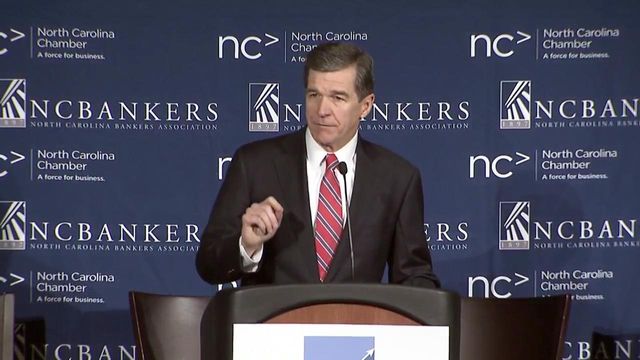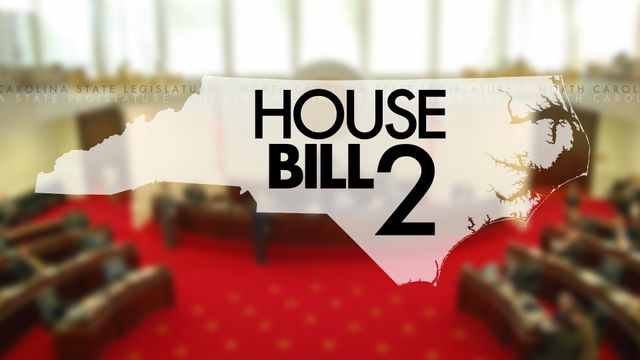Cooper seeks business help to repeal HB2, expand Medicaid
Gov. Roy Cooper urged North Carolina business leaders Wednesday to support his efforts to repeal a state law limiting LGBT rights, expand Medicaid and boost school funding.
Posted — UpdatedSpeaking at the annual economic forecast event sponsored by the North Carolina Chamber and the North Carolina Bankers Association, Cooper told attendees that he would be "an aggressive recruiter" as governor to bring jobs to the state and would work on programs to help small business. But he asked them to get behind him in three proposals that he said would help North Carolina's economy.
First, hospitals need to "step up" and provide the funding needed to expand Medicaid coverage to more low-income individuals as allowed under the Affordable Care Act. Even if Congress and President-elect Donald Trump repeal the law and make changes to health care funding, he said, Medicaid isn't likely to change, and expanding coverage to more people would create jobs and lead to more efficient care.
"It is common sense for North Carolina to keep its options open as we go into this new health care arena," he said. "By expanding, North Carolina is in a much better position to make sure that it gets its fair share."
Because the federal government is funding 95 percent of the cost of Medicaid expansion, Cooper called on hospitals to put assessments on themselves to generate the other 5 percent because they are "by far the largest beneficiaries" of any expansion.
Cooper said he plans to file by Friday an amendment to North Carolina's Medicaid plan submitted to federal regulators to allow an expansion.
State lawmakers in 2013 passed legislation blocking any expansion, and the governor told reporters after his speech he believes that law infringes on his executive powers.
"I do believe it invades on the core executive authority of the governor to accept federal funds to look out for the public health of the people, but I would rather not get into a dispute with that. I think it's important for us to try to be cooperative," he said. "Someone needs to take action. So, I'm going to take action, and then we'll try to work it out with them."
North Carolina Hospital Association spokeswoman Julie Henry said in a statement that the group's members support expanded Medicaid coverage and are ready to work with Cooper, the General Assembly and Congress on bipartisan, collaborative solutions.
Lawmakers, however, remain skeptical of expanding Medicaid.
"It was a bad deal when it was a 100 percent federal match, and it's a worse deal now that it’s a 95 percent match," said Sen. Ralph Hise, R-Mitchell. "Almost anything you do in Medicaid impacts the budget."
Cooper's plan would call covering younger, unmarried men, but Hise said lawmakers would be more interested in discussions of extending coverage to more vulnerable populations, such as those with mental health issues or developmental disabilities.
Rep. Danny Lambeth, R-Forsyth, said Cooper was "playing the political game" with his proposal.
"He knows very well he has no authority. Plus, he knows the plans will change at the federal level," Lambeth said. "He is wasting our time and his time with such foolishness."
Meanwhile, Senate President Pro Tem Phil Berger said lawmakers plan to ask federal regulators to reject Cooper's amended Medicaid plan, calling the move "brazenly illegal."
"Cooper is three strikes and out on his attempt to break state law. He does not have the authority to unilaterally expand 'Obamacare,' his administration cannot take steps to increase Medicaid eligibility and our (state) constitution does not allow him to spend billions of state tax dollars we don’t have to expand Obamacare without legislative approval," Berger, R-Rockingham, said in a statement.
Cooper pushes education spending, HB2 repeal
Cooper also told business leaders that North Carolina needs to invest more in education, from a four-year plan to get public school teacher salaries to the national average to more spending on community colleges and the University of North Carolina system.
"I would encourage you to make education a priority of the business community," he said. "I know we've been dealing with taxes and workers compensation insurance and unemployment insurance, and we've reached, I think, positions there that attention can be refocused on education to make sure we are selling ourselves at the highest level."
Finally, he said, businesses need to pressure legislative leaders for floor votes in the General Assembly to repeal House Bill 2.
Lawmakers last March passed the legislation, which sets a statewide nondiscrimination policy that excludes the LGBT community and requires transgender individuals to use bathrooms in schools and other public buildings that correspond to the gender listed on their birth certificates. Since then, North Carolina has been the target of national ridicule, and the state has lost business expansions, conventions, athletic events and concerts because of the law.
Cooper said he has been working to restore the state's reputation as diverse, welcoming and inclusive, but North Carolina needs to repeal the law to move forward.
"We were this close to getting it done," he said, holding his right thumb and index finger an inch apart as he reflected on a repeal effort that failed during a special legislative session four days before Christmas.
He called House Bill 2 "the most bipartisan issue that we have" and said a no-strings-attached repeal would easily pass if given the chance.
"The solution is simple. Three words: Let them vote," he said. "That should be the message from this group to the leadership of the General Assembly – put it on the floor for a vote."
Berger said, "It's hard to put any stock in this claim from the individual who directed all Senate Democrats to vote no on a clean, up-or-down vote to repeal HB2."
Cooper and Democrats said Berger's offer of a repeal during the recent special session was tied to conditions they could not accept.
Economists back HB2 repeal, question Medicaid expansion
The economic forecast forum also included a panel of economists from across North Carolina giving their analysis on the impact of everything from President-elect Donald Trump's tax proposals to rising interest rates on the state and national economies in the coming year.
All four were asked to discuss Cooper's push for Medicaid expansion and a repeal of House Bill 2, and while they agreed that law needs to be scrapped, they scratched their heads about the impact of wider Medicaid coverage.
"This is just terrible publicity for our state," Mark Vitner, Wells Fargo managing director and senior economist, said of House Bill 2. "I don't think we're in danger of sliding so far that we'll be the bottom of the heap in the South, but this is a real stain on the state that we need to put past us."
"There's nothing positive about it for the economy," said Harry Davis, an economist and professor of finance at Appalachian State University. "It will only become a greater issue as we go forward. That whole issue will only get worse. It can't get better."
Repealing the law won't provide a quick fix for North Carolina, said John Connaughton, a professor of financial economics at the University of North Carolina at Charlotte. He noted that Arizona's economy suffered for years after the state finally recognized Martin Luther King Jr. Day as a holiday.
"HB2 has already done the damage, and it's going to be with us for a while," Connaughton said.
Regarding Medicaid, Mike Walden, an economist and professor at North Carolina State University, said expansion would create jobs in the short term, but the long-term financial obligation could wind up costing the state later.
"This may not be an issue by Friday," Walden said, noting Congress is currently working on repealing the ACA.
• Credits
Copyright 2024 by Capitol Broadcasting Company. All rights reserved. This material may not be published, broadcast, rewritten or redistributed.






